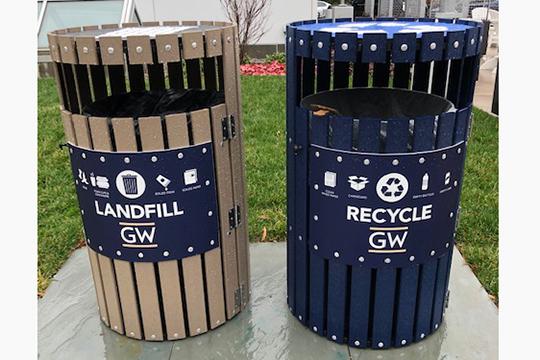Recycling and Waste
GW housekeeping and transportation teams collect and remove recycling and waste from campus.
- Recycling
All recycling needs to be clean. If it is dirty, or if you are unsure if your item is recyclable, please put it in a trash container. Trash items in a recycling container can result in the whole bag of items going into the trash.
Paper
- Empty cups and clean containers
- Flattened cardboard
- Clean cardboard pizza boxes
- Empty milk and juice cartons
- Newspapers and magazines
- Books
- Junk mail
- Office paper
Plastic
- Empty beverage containers
- Clean food containers
- Empty cups
Metal
- Clean steel cans
- Empty aluminum cans
- Empty bottles
Glass
- Empty bottles
- Empty jars
- Composting
For information about composting at GW:
- Clothing Recycling
GW is partnered with multiple clothing donation business to ensure that donated items make it to those in need, rather than in the trash.
Clothing Bins
There are collection bins for students to donate clothing in both the Mount Vernon and Foggy Bottom campuses.
- District House
- Amsterdam Hall
- Shenkman Hall
- South Hall
- Clock Tower (MVC)
Green Move-Out
At the end of the academic year, students are given the opportunity to place items that they no longer need or want in bins located in the lobby of their building. Details are typically shared 4-6 weeks before the program kicks off.
For information about Green Move-Out:
- Trash
If it is dirty, it goes into the trash.
If you do not know if you can recycle or compost the item, or if the item is really dirty, then it should be put into a trash container.
Items that consistently belong in a trash can:
- Dirty food and drink containers
- Food scraps (if you don't hold for compost)
- Straws and plastic utensils
- Tissues, paper towels, napkins
- Plastic wrap, plastic bags
- Styrofoam
- Candy and snack packaging
- Collecting Bulk Waste from Administrative Spaces
For faculty and staff, if you are cleaning out an office or you support an office that requires removal of large piles of goods, please submit a request through FixIt. This is considered a chargeable request, and you will be prompted to select a Financial Approver and enter an account number for your department.
- Toner Cartridges, Electronic Equipment and Batteries
Printer and copier toner cartridges should be returned to the manufacturer for recycling in the original packing, where possible.
If returning it directly to the manufacturer is not possible, submit a Fix-It request online to request pick-up.
In addition, GW provides e-cycling towers where students, faculty, and staff can deposit batteries, small ink print cartridges, cell phones, and CFL bulbs at these locations:
- University Student Center (Ground Floor next to elevator)
- Science and Engineering Hall (1st Floor West)
- Gelman Library (Basement Level 2).
- Shenkman Hall (1st Floor Elevators)
- Mitchell Hall (Basement)
- West Hall @ Mount Vernon Campus (Lower Level 1)
- Strong Hall (Lobby)
- District House (Level B-1 on H Street side near restrooms)
- Enterprise Hall @ VSTC (Loading Dock)
Dispose of computers (CPUs, laptops, mice, keyboards, printers, and cables), and toner cartridges at the locations below or via a Fix-It request:
- Support Building (2025 F St) Rear Loading Dock
- Academic Center-DIT (801 22nd St)
- Enterprise Hall (VSTC, 45085 University Drive) Loading Dock
- Hazardous
Items that are often considered hazardous are motor oil, rechargeable batteries, mercury-containing electronics, and bulbs/lamps.
If electronic equipment (e.g. computers, monitors, printers, faxes, copiers, televisions, cell phones, etc.) or batteries contain mercury or other hazardous materials, they must be recycled in accordance with the Electronic Equipment Recycling Policy or the Battery Recycling and Disposal Program as appropriate (see above).
- Metals
Metal items (e.g. tools, cooking utensils, furniture, toys, etc.) and scrap metal (e.g. pipes, pumps, duct work and appliances no longer containing refrigerants) must not be placed in recycling containers.
Departments should collect scrap metal and metal products in a central location and submit a Fix-It request online to request pick-up.
- Cooking Grease/Oil and Used Motor Oil
Used cooking grease/oil must be disposed of by putting it into a designated outdoor leak-proof container with lid. The container lid is to be closed at all times when not in use.
Any refined, petroleum-based or synthetic motor oil that has been used and is no longer useful (i.e. “used oil”) must be recycled in accordance with the Used Oil Program administered by the Office of Health and Safety.


